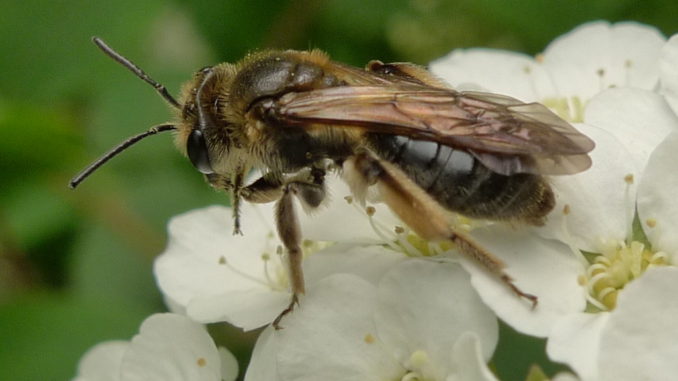
The food we eat depends on bees to pollinate the plants – and bees in turn depend on flowers for their food. Bees are especially threatened by a class of insecticides called neonicotinoids. When these systemic insecticides are applied they persist in all the tissues of the treated plants, including nectar and pollen. You can help by planting only flowers that have not been treated with neonics.
Fortunately many local seedling sales offer locally grown, untreated plants every spring. Due to the COVID-19 pandemic, these annual plant sales are taking place online.
Mass. Audubon Habitat, 10 Juniper Road, Belmont.
Online Herb Sale. Place your order from April 12 to April 30. Choose delivery on May 8 or pickup on May 9.
Herbs, annual flowers, vegetables.
Waltham Fields Community Farm, 240 Beaver Street, Waltham.
Online Seedling Sale. Place your order from April 12. Choose pickup on May 8 or May 14.
Vegetables, annual flowers, herbs.
Gore Place, 52 Gore Street, Waltham.
Online Plant Sale. Place your order from April 19. Schedule pickups on or after May 15.
Heirloom tomatoes, peppers, herbs
Newton Community Farms, 303 Nahanton St., Newton Centre.
Online Seedling Sale. Place your order from April 7. Schedule pickups between May 14 to 17.
Vegetables, herbs, annual flowers. $20 minimum.
Grow Native, 240 Beaver Street, Waltham.
Online Plant Sale. Open to members. Schedule pickups between June 10 to 12.
Native perennials, ferns, grasses, trees, and shrubs.
Underwood Greenhouses, 20 School Street, Belmont.
Place online orders beginning April 24. Pickups begin May 5.
Annual flowers, vegetables, herbs, perennials.
Garden in the Woods, New England Wildflower Society, 180 Hemenway Rd., Framingham.
Garden shop opens beginning April 11. In store shopping by appointment only.
For online orders, email your order and pickup in-store. Native trees, shrubs, perennials, wildflowers, grasses, ferns. Pollinator kits.
Middlesex Conservation District, pickup at Kimball Farm, 400 Littleton Rd, Westford, MA 01886.
Spring Plant Sale. As of April 21, online pre-orders are closed. Plants will be available on the pick-up days, April 30 and May 1.
Lexington Community Farm. 52 Lowell St, Lexington, MA 02420
Self-serve organic seedling sale May 1–May 30, with staffed days May 8 & 9. Produce sales start in June.
Lexington Land Conservation Trust. Pickup at Lincoln DPW 30 Lewis St, Lincoln, MA.
Members may order spring planting kits until April 30. Plants chosen for their value to at-risk bumblebees and other pollinators. Pick up for plants is on May 22.
Garden Centers Committed to Healthy Bees
Note: A common supplier in our area is Cavicchio Nurseries. Plants labelled “Grown by Cavicchio” are untreated. If plants are labelled “Grown for Cavicchio” or simply “Cavicchio”, we cannot be sure whether they were treated.
Russo’s, 560 Pleasant Street, Watertown: They have a section of untreated native plants from Garden in the Woods.
Wilson Farm, 10 Pleasant Street, Lexington: Plants grown by the farm are untreated – ask the grower to show you.
Pemberton Farms, 2225 Mass Ave, Cambridge: Does not sell plants treated with neonics.
Mahoney’s, Several locations: Plants grown by the nursery are untreated – ask the grower to show you.
Allandale Farm, 259 Allandale Road, Brookline: Plants grown by the nursery are untreated – ask the grower to show you.
Russell’s Garden Center, 397 Boston Post Road, Wayland: Their vegetables are all organic, and they practice IPM.
Whole Foods, Several locations. Sells organic seeds and plants.
What about big-box stores?
Several chains have pledged to stop selling products and plants containing neonicotinoids by 2019. BJs sells no pesticides containing neonics. All their plants, except poinsettias and blueberries, are untreated. Lowes and True Value stores should have no neonic-containing products or plants. Home Depot should have no treated plants. If you find products or plants containing neonicotinoids, please bring it to the attention of management and ask when their pledge will be fulfilled. Finally, Ace Hardware has begun phasing out products containing neonics. Until all plants on sale are safe for bees, keep asking for plants free of neonics.
Organic products do not contain neonicotinoids. To check for neonic-containing products, make sure the ingredients do not include any of the following chemicals: Imidacloprid, Clothianidin, Thiamethoxam, Acetamiprid, Dinotefuran, Nitenpyram, or Thiacloprid.
